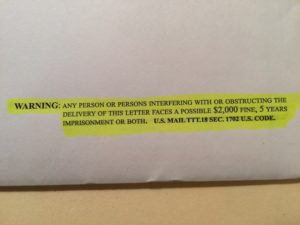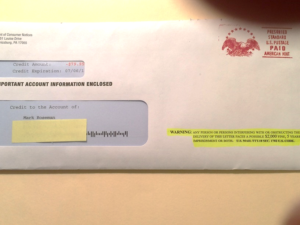 The subject matter for a prison reform blog can come from anywhere, even a piece junk mail. Usually, junk mail letters are instantly recognized as trash. However, some give enough compelling information on the outside to warrant being opened—so you can confirm its irrelevance.
The subject matter for a prison reform blog can come from anywhere, even a piece junk mail. Usually, junk mail letters are instantly recognized as trash. However, some give enough compelling information on the outside to warrant being opened—so you can confirm its irrelevance.
I recently received a piece of enigmatic junk mail from an unknown sender: Department of Consumer Notices. It was addressed to me and had a sentence above my name stating, “Credit to the Account of: Mark Roseman.” My attention was piqued. The yes/no debate in my head decided on yes—open it. The part about a credit to my account persuaded me to reach for a letter opener.
As I slipped the point of the opener under the flap of the envelope, I noticed a warning on the bottom right corner (see the photo above). I was being warned that “any person or persons interfering with or obstructing the delivery of this letter faces a possible $2,000 fine, 5 years imprisonment or both. U.S. Mail TTT: 18 Sec. 1702 U.S. Code.”
The warning flashed me back to when, as a child, I first saw a tag that said “Do Not Remove This Label” on the bottom of an upholstered chair. Doing so was somehow wrong and would expose me to unimaginable penalties and bad things happening, at least in my childhood mind.
The Envelope Please
The photo (below) of the envelope I opened shows a notification that a credit of $79.95 had been assigned to my account. It also shows the credit expiration date (so I’d better move fast!). When I opened the envelope, I found that the credit would be for the purchase of a Gettysburg Address commemorative coin. I’d been taken—I had given in to my curiosity and opened the junk mail.
Obstruction of Correspondence: Federal Law Title 18 U.S. Code § 1702
The warning language of the postal code continued to nag me for some time. Why did the sender of this unsolicited commercial junk mail authorize this silly warning? What’s the concern about the obstruction of this letter? If the notice was designed to increase the odds that people (including me) would open the envelope, didn’t the sender consider that I would not purchase monthly previews of coins depicting a slice of American history—subject to my cancellation at any time?
I soon experienced a sick feeling caused by a marketing campaign employing criminal law to scare and confuse people into making a sale. Judge for yourself; here’s the full language of the law referred to on the envelope:
Whoever takes any letter, postal card, or package out of any post office or any authorized depository for mail matter, or from any letter or mail carrier, or which has been in any post office or authorized depository, or in the custody of any letter or mail carrier, before it has been delivered to the person to whom it was directed, with design to obstruct the correspondence, or to pry into the business or secrets of another, or opens, secretes, embezzles, or destroys the same, shall be fined under this title or imprisoned not more than five years, or both.
As Queen Gertrude opines in Shakespeare’s Hamlet, referring to insincere overacting by a key cast member, “The lady doth protest too much, methinks.” The notice is given in a defensive tone. Why not simply sell your wares and leave bullying language out of it? Beyond the cheap-shot ridiculousness of the criminal warning on the letter, I can only conclude it was used to induce some level of fear or concern about handling and responding to the junk mail.
Sometimes It’s Best to Look for the Humor
This marketing trick weaponizes the law to try to get a solicitation letter opened. Does a criminal warning promote more attention by the recipient? In this day and age, anyone with a design to obstruct a sales letter to buy commemorative coins could not conceivably be construed as prying into the business or secrets of another; this is just a nefarious, silly marketing plan concocted by the writers of this vacuous warning.
The letter arrived in the usual fashion—in my mailbox. Here’s a scenario of interference the sender could have contemplated: had it been stolen from my box and given to someone who happened to have my name, and he opened it, would a potential sale be delegitimized because the promotion was stolen from the intended Mark Roseman?
Getting Real
Regardless of the intent, the authoritative language tells a lot about our divisive American culture. Part of the culture is pulsating in a lock-anyone-up mentality that rudely flows out of the mouth of our president and spikes choral repetitions from his mindless minions. Got a problem with someone? Solve the problem with incarceration and a fine. In this case, obstructing the delivery of a solicitation letter can supposedly earn you five years in prison or a $2,000 fine—or both. Short of hijacking a US letter carrier and causing a problem with mail delivery, the subject warning is simply an attempt to heighten the significance of the content of a crafty solicitation letter using a hollow bullying tactic, the likes of which we’re bombarded with by every news cycle.
Sobering facts underscore the ridiculous use of postal warnings on junk mail to increase the number of people in California’s prisons. The recently released California State Budget, 2018–19 includes the next fiscal year’s budget allocation for the California Department of Corrections and Rehabilitation (CDCR). The authors of the budget curtly describe the CDCR as a state authority that “incarcerates the most violent felons, supervises those released to parole, and provides rehabilitation programs to help them reintegrate into the community.” While the CDCR also incarcerates nonviolent offenders, that population is not mentioned. I’d wager that none of California’s 126,890 average projected inmate population will be doing time for interfering with the distribution of junk mail, other than for outright postal theft. California has allocated $12.1 billion for CDCR in it its budget. The number of inmates and the cost of their mass incarceration is serious and sad. The same applies to criminal warning shots on the outside of junk mail.
I welcome your comments and observations.
Photos courtesy of the author
